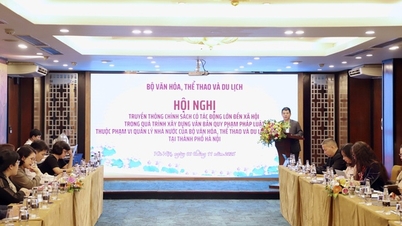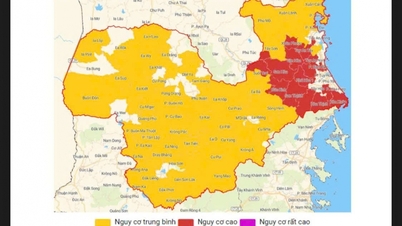Besides this name, long-term resort business contracts (usually with a contract term of several years to several decades) also appear under many names such as "resort contract", "happy vacation service contract", "family vacation contract", " travel card purchase contract"... This article provides people with an overview of the long-term resort service business model and some issues arising from the perspective of protecting consumer rights as well as recommendations from state management agencies on protecting consumer rights.
1. Overview of the long-term resort service business model (vacation ownership)
Long-term resort business services provide customers with vacation rights/vacation ownership rights including: the right to stay at the resort and the right to use accompanying services (with or without fees). The buyer of vacation rights/vacation ownership rights will have the right to use the resort apartment/villa for a long period of time for themselves and the people they register. Customers will pay the cost of vacation rights/vacation ownership rights by paying the entire contract value before using the service ( usually from 200-800 million VND depending on the type of apartment and time ). In addition, customers may have to pay other costs such as maintenance fees, annual fees, transfer fees, exchange fees... Vacation rights/vacation ownership rights are not real estate ownership.
Currently, there are 03 types of long-term resorts, including:
- Fixed week off : is the most basic and popular type. Accordingly, customers buy a specific week off in a year, in a specific room type. When there is a need to change the time of vacation, split the week off or change the room type, customers need to notify the service provider in advance according to the company's regulations and pay an additional fee. However, whether or not the week off can be changed depends on the availability of rooms at the resort.
- Flexible week or floating week : customers own a week of vacation at the resort with a fixed room type and no specific time. Accordingly, customers can register to go on vacation at any time of the year.
- Holiday card or cumulative point card : the company provides customers with a certain number of points and each time they go on vacation, depending on the time, room type, and number of people on vacation, the account will be deducted a corresponding number of points. The annual vacation week is not fixed but flexible according to the needs of the customer.
A vacation ownership business may or may not own the resort. In the case of a vacation ownership business, the vacation ownership may be sold as a “ future formation ” as a form of capital raising for the owner to use the proceeds to build the resort.
The common way for businesses to approach and invite customers to participate in long-term vacation models is to organize events to give gifts, give free vacations and survey people's travel needs. Here, according to many people's feedback, companies use many strategies to exploit the psychology of event and seminar participants so that people can deposit or sign contracts hastily without thoroughly understanding the seller, the nature of the service, the conditions and content of the transaction, for example: giving discount coupons, giving free vacations; providing too much and exaggerating, even untrue, information about vacation benefits, attractive investment opportunities; hiding some important information such as the buyer's obligations, additional fees, unfavorable terms in the contract, etc.
The common characteristics of these long-term resort contracts are: providing accommodation rental services with long contract terms ( from several years to several decades ); customers stay at resorts ( originally owned by the seller or the seller associated with the original owner ) and use accompanying services for a certain period of time each year for themselves or their relatives; customers must pay the entire contract value before the service is provided; in addition to the initial contract value ( several hundred million VND ), customers may have to pay additional annual fees and other fees during use... and usually the buyer cannot cancel the contract.
2. People's feedback on some risks from long-term resort service/vacation ownership business activities
Through people's feedback, some risks that may occur to people from this operating model are as follows :
(i) The seller designs methodical sales strategies to attract the buyer to enter into the transaction in a hurry.
According to people's feedback, the common way of approaching and inviting customers to participate in long-term vacation services at businesses is to organize events to give gifts, give free vacations and survey people's travel needs ( especially the elderly ). Here, companies use many sophisticated and methodical sales strategies, causing many people to deposit/sign contracts hastily even when they have not been provided with full information about the product and have not been provided/have not studied the contract. According to people's feedback, these strategies can include: giving discount coupons, giving free vacations; providing too much and exaggerating, even untrue, information about vacation benefits, attractive investment opportunities; concealing some important information such as the buyer's obligations, arising fees, unfavorable terms in the contract... When realizing that the product in reality does not match the wishes ( such as buying for profitable investment but not being able to transfer to a third party; buying to have ideal vacations with the family but the requirements for advance booking time are too strict as well as realizing the disadvantages and risks from the established transaction, people ask the seller to terminate the contract and refund the money but it is not accepted.
(ii) The seller designs the transaction content to pose risks to the buyer.
In many cases, in parallel with sales strategies, the Seller designs pre-existing transaction terms ( from deposit agreements to vacation provision contracts ) in the direction of gaining legal security for itself. Normally, the buyer must pay the entire contract value before using the service; must pay an additional floating annual fee that lasts for the entire contract term even if the service is not used, and cannot be transferred to a third party; the conditions for booking, transferring the contract/rental of the vacation are difficult; the contract cannot be canceled but the seller can unilaterally terminate the contract and lose all the money paid in many unfavorable cases ( for example, violating the obligation to pay the annual fee for 3 years; violating the rules and resort policies prescribed by the seller, amended during the contract term... ); the seller's obligations are stipulated in the contract very sketchy and loose; The cases of violation and the sanctions for handling violations between the two parties are designed in a way that is significantly more disadvantageous to customers.
(iii) The seller does not own the resort but still provides long-term resort services and collects the entire contract value from the buyer before providing the services.
During the contract implementation process, many people reported difficulties in booking rooms at resorts associated with the seller because the seller announced that there were no rooms available or the resort had stopped cooperating with the seller.
In the current long-term resort service business market in Vietnam, although the buyer must pay the entire contract value ( up to several hundred million for a period of several decades ) before the service is provided, in many cases, the contract is signed by the seller who does not own the resorts . Furthermore, the contract does not stipulate the seller's performance guarantee measures for the buyer; does not list the specific resorts where the seller is obliged to provide vacations to the buyer, nor does it stipulate the seller's obligation to prove the cooperative relationship between the seller and the resort owners at the time of signing the contract. Therefore, the buyer's interests not only depend on the inherently unfavorable contract terms but are also governed by the cooperative relationship between the seller and the third party ( from the resort location to the price, service quality, resort rules, etc. ), and even face many risks if the seller goes bankrupt or loses the ability to perform the contract.
3. Recommendations of the National Competition Commission
From some potential risks reflected by people above, to avoid unwanted situations, the National Competition Commission recommends consumers:
First of all , before deciding to participate in a product introduction event, you need to find out information about the type of product or service introduced at the event as well as the supplier through the media or through friends and relatives who have participated in the event or used the product; determine in advance the issues of concern regarding benefits and risks to proactively request further clarification.
At the same time , before deciding, it is necessary to request a full set of contracts and study them carefully, especially the following issues:
- Clearly identify your and your family's needs over a long period of time.
- Compare the information advertised, offered or "verbal commitment" of the business with the official terms and conditions in the draft contract. Especially when there is a discrepancy between the information offered and the contract or there are unclear provisions and terms in the contract, consumers need to ask the business to explain, clarify and amend or supplement. For example: description of the services provided, terms on the rights and obligations of the customer and the business; terms on contract value and types of costs; terms on contract termination; terms on handling violations...;
- Clearly identify all costs that must be paid during the contract term . Most current vacation ownership contracts are long-term contracts and in addition to the fixed fee from the beginning, consumers will also have to pay many other fees that arise during the implementation process such as maintenance fees/ annual fees/ management fees/ operating fees/ fees for exercising the right to exchange resort locations... These costs may only be specified in the contract (not in advertising or sales information) and may not be clearly and fully specified ;
- Conditions and restrictions for the buyer in enjoying and transferring the right to vacation, for example: the time when the right to vacation can begin to be exercised, can this service be transferred to another person, if so, how long after signing the contract or using the service, are there any conditions attached...;
- Unfavorable terms in the contract, for example: limiting the buyer's right to complain or sue; not allowing consumers to cancel the contract; unfair sanctions for violations between the two parties; cases where the service provider is exempted from liability, for example, not being granted a construction permit by a state agency ( for the type with a project/hotel ) or the third party not continuing to cooperate ( for the type without a project/hotel ).../
Source: https://moit.gov.vn/tin-tuc/bao-chi-voi-nguoi-dan/mo-hinh-kinh-doanh-dich-vu-nghi-duong-dai-han-so-huu-ky-nghi-va-mot-so-van-de-phat-sinh-duoi-goc-nhin-bao-ve-quyen-loi-n.html




![[Photo] Closing of the 14th Conference of the 13th Party Central Committee](https://vphoto.vietnam.vn/thumb/1200x675/vietnam/resource/IMAGE/2025/11/06/1762404919012_a1-bnd-5975-5183-jpg.webp)

![[Photo] Prime Minister Pham Minh Chinh receives the delegation of the Semiconductor Manufacturing International (SEMI)](https://vphoto.vietnam.vn/thumb/1200x675/vietnam/resource/IMAGE/2025/11/06/1762434628831_dsc-0219-jpg.webp)































































































Comment (0)